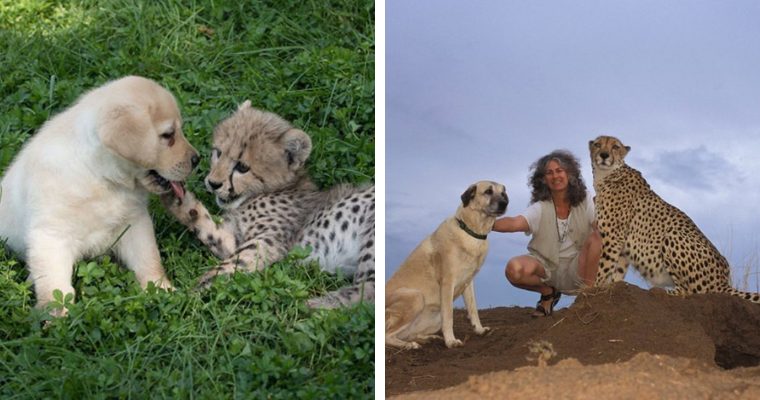
For decades now, some zoos have been pairing cheetah cubs with a peculiar set of adoptive siblings – dogs. These dogs help the cheetahs build confidence and increase their chances of reproducing.

It is widely known that dogs are man’s best friend and their companionship has a therapeutic effect. Therapy dogs are present in programs for children with difficulties in socializing, as well as in rehabilitation programs in prisons. Dogs are not only good friends with people, but they also often get along well with other domestic animals. However, can they be “friends” with wild animals?
Surprisingly, dogs have also proven to be the best friend of cheetahs. For decades, some zoos have been pairing cheetah cubs with socialization problems with dogs, which help them gain confidence, learn how to behave in groups, and increase the chances of successful reproduction.
This idea started in 1976 out of necessity at a wildlife park in the United States and was so successful that several zoos adopted it for their cheetah breeding programs.

A fascinating tale of interspecies friendship began in 1976 in Winston, a small town in Oregon home to the Wildlife Safari animal park. The conservation program’s then-manager, biologist Laurie Marker, faced a problem when taking care of a cheetah cub named Khayam: he was an only child, lacking a companion to learn how to socialize with and no other cubs of his age to adopt him as a brother. Dr. Marker decided to try his luck with another species and turned to a Labrador puppy named Shesho. Cheetahs are the closest African felids to cats, so if a dog and a cat could be friends, there was at least the possibility that it would work with a cheetah. And it did: Khayam and Shesho formed a friendship at first sight and grew up like siblings, oblivious to their different species.Dr. Marker noticed that Shesho’s presence seemed to provide tranquility and security to Khayam, so she proposed to the San Diego zoo to provide a canine companion for one of their cheetah cubs. Once again, the pairing was successful. Since then, other zoos have experimented with this unlikely union.

PHOTO: COURTESY OF CHEETAH CONSERVATION FUND
What’s the secret behind this strange friendship? The key lies precisely in the differences between the characters of each species. Cheetahs are timid animals and, unlike lions who are born into a herd, they learn to interact with others of their kind by playing with their siblings. If this figure is missing, they have no one to develop their social behavior with, which can cause problems in adulthood.
Cheetahs are solitary animals that, in nature, typically do not live in groups except when it comes to a mother and her cubs or a group of young males, usually brothers, who form coalitions to hunt together. But in an enclosed environment like a zoo or wildlife park, they are forced to share a small space with other individuals, a situation that is unnatural and often causes a lot of stress.
If they haven’t been adequately socialized, this can lead to anxiety and aggressiveness. Moreover, these individuals show little interest in mating, and occasionally, mothers can neglect their cubs. In threatened animals like cheetahs, breeding is a critical objective of conservation programs.
